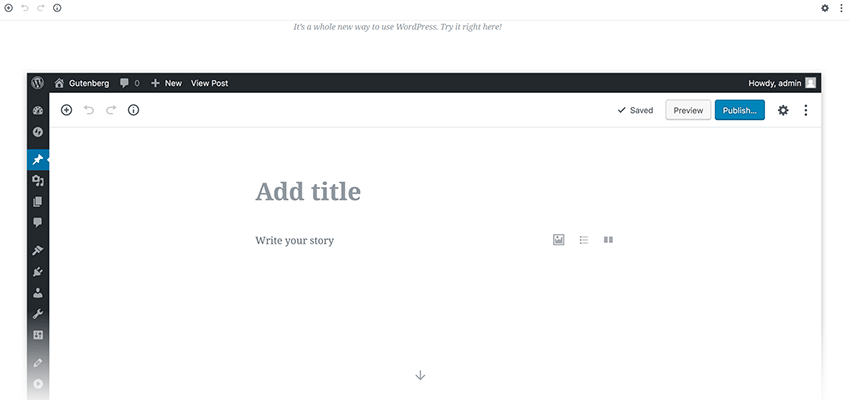Software Inevitably Changes – WordPress is No Exception
For those of us who work on the web, the tools we use are incredibly important. We tend to get attached to them. Some of us even go out of our way to promote a particularly good one.
Over the past 15 years, WordPress has been a tool that perhaps benefitted from this loyalty like no other. A small community of diehard supporters has turned into a massive one. There’s a marketplace for themes and plugins. There are numerous users who volunteer their time in capacities official and unofficial. Today, the WordPress community is a force to be reckoned with.
As WordPress has grown into the CMS of choice for so many, so has the criticism of its continued evolution. And with the new Gutenberg editor, things have reached a fever pitch.
This raises a few important questions. How much weight should critics carry? And, what should we reasonably expect from WordPress in terms of new features? Let’s dive in and see if we can find some answers.
The Sky is Falling…Or Not
The coming rollout of Gutenberg in WordPress 5.0 has garnered a lot of opinions. Since the first steps towards its creation, there has been a mixture of excitement and dread within the community.
Then, as Gutenberg was released as a beta plugin, the stuff really started hitting the fan. While we won’t go over every criticism, suffice it to say that some users expressed concerns of sites breaking due to theme or plugin incompatibilities and a buggy UI. Then there were those who had philosophical objections to parts of, or even the very existence of the project.
There are indeed a number of legitimate concerns. But there has also been an element of what I’ll respectfully describe as fear of the unknown. It too has a place in the conversation. But so often it seems to shout over everything else without adding anything productive.
However, that fear of the unknown should fade over time. As users become more accustomed to a change, it stands to reason that they won’t have nearly as much anxiety.
Personally, this has been my own experience with Gutenberg. The more I use it and the more bug fixes that get released, the more comfortable I am. Not to say that there still aren’t plenty of areas for improvement. But at least I’m starting to see a light at the end of the tunnel.
Still, it seems like there is a lot of emotion out there. We’re seeing a number of 1-star reviews and some developers have even begun to develop their own forks of WordPress. Fair or not, people are attached to the old way of doing things.

Change is Natural
What tends to get lost amongst all the hype is that, if software hangs around long enough, it’s going to change over time. WordPress just happens to be at a point where its wide usage is calling more attention to these changes.
Operating systems, for example, are famous for annoying a subset of users with UI and feature changes (I’m looking at you, Microsoft). Not everyone likes to change the way they work, even if the end result really is an improved product. There is something to be said for comfort and predictability. When that’s disrupted, users cringe.
WordPress is reported to power over 30% of the web. So, it makes sense that a major change such as Gutenberg would cause some unrest. That number covers a whole lot of preferences, use cases and opinions.
The trick for any software developer is that they have to balance the greater need of maintaining a viable product with keeping existing users happy. There are no easy answers, and WordPress certainly isn’t immune from having to make these difficult decisions.

You Can’t Always Get What You Want
That leads us to Gutenberg. There was, whether we agree with it or not, a determination that the Classic Editor was becoming outdated. Eventually, it was decided that a new editor was the best way to address the issue.
Knowing that you can’t please everyone, the preferred course of action is to create the best product you can. Take care to ensure that it works on as many existing websites as possible. Take constructive criticism seriously and make compromises where you can.
WordPress has even taken this a step further. Instead of forcing Gutenberg on everyone, they have also provided an alternative path. The Classic Editor plugin keeps the familiar content editing experience and will be supported for the foreseeable future.
While that may not be the perfect solution to some, it is a way forward for those who don’t want to (or unable to) change.
Even with that compromise, there will be some users who refuse to come along for the ride. While that’s certainly not what WordPress wants, it is part of the price you pay for implementing major change. You might say that it’s a philosophy of knowing that you’ll lose some users now, with the hopes of making greater gains in the future.

Gutenberg is Part of a Constant Evolution
I am very much a creature of habit when it comes to how I work. For me, change means that I have to take precious time out of my day to relearn how a tool works. It disrupts my routine. The whole experience is generally not something I would voluntarily seek out.
But I’ve also come to the point of realizing that change is inevitable. And it often pushes things in the right direction. If it didn’t, I’d still be writing HTML by hand and using tables for layout.
What’s interesting about the Classic Editor is that, in an industry that changes so quickly, it has managed to stick around for a very long time. Sure, it’s undergone incremental improvements. But the basic experience has been the same. It’s always familiar and comfortable – even if it occasionally is a pain to work with.
Still, things move forward. Web design is a field that constantly challenges us to adapt to what’s new. For better or worse, Gutenberg is just one more change. We can expect that there will be more to come.
from News Aggregator - Top News Stories From Your Favourite News Source | News Vally https://ift.tt/2xQfTjr




Post Comment
No comments
Post a Comment